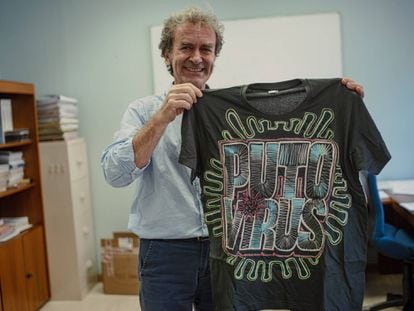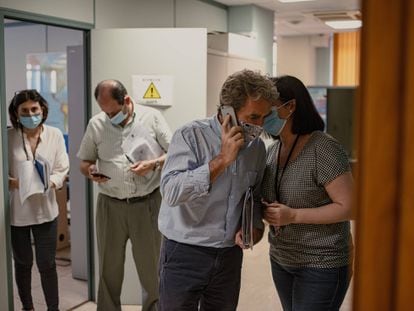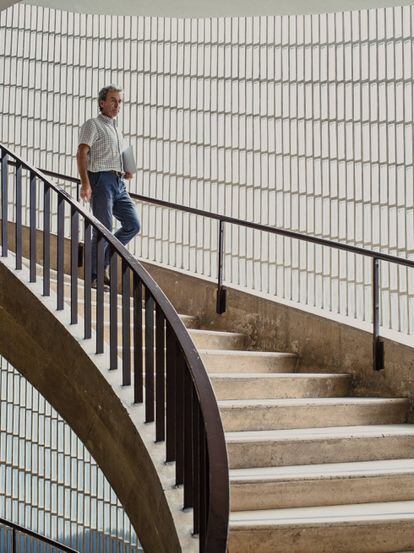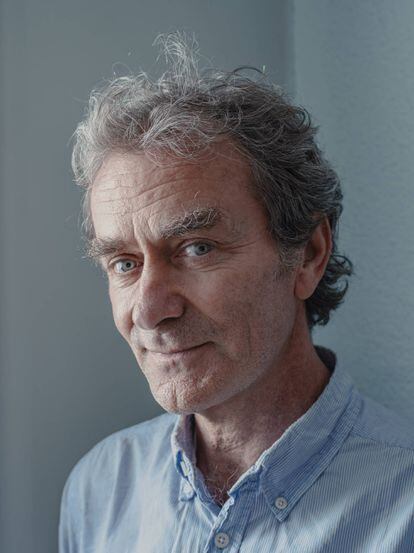Fernando Simón: dissecting the public face of Spain’s coronavirus crisis
As the head of the Health Ministry’s Coordination Center for Health Alerts, the 56-year-old doctor from Zaragoza, who turns up every day on his motorbike, found himself center stage during the pandemic in Spain. His handling of it has brought him admirers and critics in equal measure
/cloudfront-eu-central-1.images.arcpublishing.com/prisa/GUSLW7FQGZC5PMDXFAGADEFXB4.jpg)
Silence... Not just any silence, but the kind you get in critical situations, as if to pull them back from the edge. It was that kind of silence that fell when Spain’s prime minister, Pedro Sánchez, decided to freeze all non-essential economic activity during the state of alarm, after a meeting in La Moncloa, the seat of government, at the end of March. This is how Fernando Simón, the expert who had just assumed a fundamental role in the crisis, remembers it. He sat next to Sánchez and several other decision-makers and said, “If measures are not taken to reduce the risk, the death toll could be in the hundreds of thousands and the health system could collapse.”
Sánchez, who heads a coalition government made up of his Socialist Party (PSOE) and the leftist Unidas Podemos, had asked him for his opinion as the situation in Italy spiraled out of control. Catastrophe was looming on all fronts. Decisive action was called for.
Simón had been issuing warnings for several days as the health crisis escalated globally. He and his team from the Health Alert and Emergency Coordination Center (CCAES) had analyzed the possible scenarios. He issued the warnings again. And it was then that the prime minister took the decision to tighten the lockdown and paralyze the country’s economic activity even further.
“At that moment, I felt like 300 kilos of stone was bearing down on me. I also put myself in his [Sánchez’s] place and thought: ‘What an incredibly brave guy,’” he says.
The silence seemed to confirm that the country was closed for business – a country within a continent that was also being sealed off, within a world facing an abyss of uncertainty.

Fernando Simón was there. Although his role at the heart of the crisis may have seemed incidental, this doctor from Zaragoza, who will turn 57 at the end of July, had been preparing for just such a scenario, the worst that could hit a developed country. Now the hypothetical had suddenly become a reality. He was there, in the room where the most difficult decisions were reached; decisions that would have a huge impact on people’s lives and future. He was the one giving the instructions that would trigger that impact – an unavoidable course of action, one that nobody wanted. “In situations like this, the only thing to focus on is on what you can do. Forget about what you want, put it out of your mind,” he says.
That March morning, he probably arrived at the Ministry of Health on his motorbike at around 7.30am. The bike is a Suzuki he bought years ago from a friend for €1,000. “I like to fix what isn’t broken, instead of throwing it away,” he says, and referring to the leather jacket that is older than the bike, he adds, “I bought it in 1991 and it’s still in perfect condition. It cost me 50,000 pesetas at the time [about €300].” Within the ministry, he would have headed to the CCAES headquarters, as he has done almost every day since former Popular Party (PP) Health Minister Ana Mato appointed him agency director in 2012. EL PAÍS SEMANAL spent two days with Simón and his team, which currently consists of 15 people, including doctors, biologists, nurses and data specialists.
Since his appointment, Simón has dealt with several crises, the most notorious being Ebola in 2014, although there were no fatalities and only one infected person in Spain. It caused a stir, but nothing in comparison to the coronavirus. In fact, the Covid-19 crisis is unrivaled in that respect. “We had been expecting a major pandemic since the beginning of the 21st century,” says Simón. “This is it.”
By the second week of March, Simón and his team were working without respite. When the situation was at its worst, the CCAES team was expanded to 24 people. Each member needed all their strength to cope with the unrelenting demands of the task confronting them, one that kept them flat out day after day, night after night, weekend after weekend. “We were in the hands of the best specialists in their field in the country, with the best contacts in the world,” says Simón. “Without them, we would have gotten nowhere. On March 9, we realized the situation was out of control. The scenario in Italy was a sign of what was to come.”
But what about before that? What about the signs coming from China? Was that just Western arrogance?
“We thought we knew more than we did – enough to control it. But the reality is that we didn’t detect it fast enough to stop it,” says Simón, sounding repentant. He is alluding to Spain, but also to the rest of the EU. Experts from the European Center for Disease Prevention and Control also underestimated the risks at a highly controversial meeting on February 18, when the pandemic was about to take hold in Italy. “We started to assess different possible scenarios there,” says Simon. “I honestly don’t know how many infected people I had in my head then, but they never reached the almost 250,000 we have now in Spain.”

Apart from the mortality rates, the main fear was that the health system would be completely overwhelmed. The big question at that point was how many cases were already circulating in Spain, and to what extent a tsunami of cases could be dealt with. So, did the system break down?
Simón thinks for a moment, then says, “No, not on a national scale; in specific areas, almost. But when it came, there was a capacity to respond. There was a period of time when 55% of the beds across Spain were being used by coronavirus patients.”
Now the focus is on fresh outbreaks. The first day that EL PAÍS entered the CCAES headquarters, following the end of the state of alarm, there were 13 active outbreaks. The worst was over and Simón had been able to stay home for three consecutive weekends. “And to get sleep, a lot of sleep,” he says. His wiry frame is recovering the strength that once sustained him on the rugby pitch and now serves to pull him up rock faces.
Simón is in permanent contact with regional government authorities, and keeps abreast of any potential outbreaks. On his desk, the folders pile up. One of them is entitled “Future World.” What does it contain? “Ah, that’s a secret,” he says. Future projections – perhaps similar to those he was making 10 years back. “Ten years ago, while drawing up response strategies, we put ourselves in the worst-case scenario for a developed country, and that is basically what has happened,” he says.
Hopefully, this folder will also set out solutions, ways to avoid more disaster. In the meantime, Simón measures, reflects, and thinks about the strategy that has been employed. He counts and recounts and examines the figures over and again. “They mean nothing in themselves,” he says. “First, you must be familiar with the sources, which must be reliable and checked. And then the data must be used for specific purposes. Producing data is very complex, much more so than handling it.”
So to what extent can we trust the data?
Something about Simón’s reaction suggests the question makes him uncomfortable. He was severely criticized for his vacillation during certain phases of the crisis, and for changing the way that the data is measured. He would like to apply to politics the scientific logic used to analyze data.
“What is one more or less when we’re talking about 28,000 victims?” he says. “Does it make a difference? According to some journalists, one death is news but 1,000 deaths are statistics. The data is useful if it helps to understand the problem and provide solutions. Our work is not about individuals, but populations. We put the puzzle together with the information that the regional governments provided us with. We have been obsessed with checking their reliability. They have all done and continue to do an exceptional job.”

While coordinating with regional authorities, Simón has nurtured the kind of work ethic that knows no limits. “I don’t have them,” he says. “I don’t think anyone does. And if they do exist, you have to try to forget about them, not give them the slightest chance. Boundaries are there to be overcome, just like dogmas.”
This is the essence of the man. “He has always done what he wanted to do, but with a spirit of serving the community” says Health Minister Salvador Illa, who has had time to become acquainted with Simón in particularly challenging conditions. Both Illa and Simón share a serenity, evident in the past few months, that seems infectious.
“I couldn’t lose my cool,” Simon says. “When you have to explain dramatic scenarios to those who have to make the decisions, you have to do so very calmly so they really understand what is important. But you also have to make them see the uncertainties attached to each of the possibilities.”
Simón has both the experience and the psychology for the job, the latter undoubtedly inherited from his father, a psychiatrist who is now 89 years old. “He has been an incredibly active man who has managed to recover from two big blows, being widowed twice,” he says. “He asks me a lot of questions; at times he feels worried about me, and at times he feels proud.” Simón’s mother died when he, the second of six siblings, was eight years old.
Simón has a wealth of experience when it comes to extreme situations – his career as an epidemiologist has taken him to Burundi, Somalia, Tanzania, Togo and Mozambique. “When you have to go to a hospital in Beira [Mozambique] to control a cholera epidemic and, as soon as you arrive, you can see the medical team is useless because they do nothing but cry, what do you do? You convince them that even if hundreds die, they will save thousands, and that’s how you restore their morale.”

He has also worked in Guatemala and Ecuador, and been inside the classrooms of the London School of Hygiene and Tropical Medicine, in the UK, and the Institut de Surveillance Sanitaire in Paris. His wife, Maria Romay-Barja, and their three children have accompanied him on almost all his travels.
In Paris, apart from learning how to manage different scenarios, he signed up for a course on communication. “We left quickly,” he says. “We thought it was absurd. They were obsessed with talking about what they call the win-win strategy, with trying to get us to eat each other alive like sharks. They based everything on image, they even told us what kind of clothes would suit us.”
They also inquired about his hair and his response was the same as it is today: “I stopped combing my hair when I was 15.” As for color schemes, they probably didn’t recommend the grey or muted shades of blue he has worn throughout the crisis, along with the un-ironed shirts. “The iron came in handy at one time because it was used to kill bugs,” he says. “Then washing machines and detergents were invented and did a good job with the clothes, and now the iron has become a tool for image and domination. Who irons? Women, generally. I don’t even know where the iron is in my house.”
Simón’s style of communication is not to be found in textbooks, which may have something to do with the fact he has become an unlikely pop icon who has t-shirts made for him, gifts sent to his office, and even busts sculpted in his image. But while he inspires overwhelming confidence in some, his critics feel an equally crushing measure of aversion. This is undoubtedly because he does not play to the gallery, calculate strategies or use social media. “There’s a confusion regarding the press conferences,” he says. “I am not speaking to the journalists. I direct myself to the public.”
So, with his disheveled appearance – including stubble, and hair and eyebrows that rarely see a trim – he has managed to develop a strange complicity with a section of the public. Dressed in sweaters and jeans, and looking more like a hippy than an executive, his media appearances throughout the crisis contrasted sharply with the appearances from members of the military and police with their medals and stripes. “In fact, I’ve tried not to learn any protocol,” he says. “I want to make sure it does not stick.”
According to Salvador Illa, both communication and leadership are among Simón’s innate qualities. “In that sense, he already has the attributes that are taught by experts and which many, despite their efforts, never achieve,” he says. “He also has a natural charisma with his teams and, above all, he is a good person. There is no doubt about that when you deal with him.” The only thing that concerned Illa in in the past few months was Simón’s use of his motorbike. “His obsession with the bike: I had to get firm about that,” he adds. “When tension and risk were at their peak, I didn’t like him moving around on the motorbike, and I told him so. And I didn’t let him use it when we were going to La Moncloa. I said, ‘Do us the favor of getting into the car, Fernando!’”

But for Simón, the daily trips on his Suzuki give him the space to think. “When you get to the office, you unfortunately don’t have much space to reflect, to stop and examine things quietly,” he says. “I do that on the bike.”
Salvador Illa was determined to take care of Simón at the height of the crisis and his heart sank when he heard the doctor had contracted the virus. “Fortunately, it was only a few days,” says Illa, who even remembers the exact date he tested positive: March 30. But Simón’s symptoms were mild and during his recovery, he was able to keep a handle on the situation. “I didn’t even realize I might have it,” he says. “I thought it was fatigue. I spent a night with a bad cough and a day with a temperature, that’s all. My children left food at my door – they were wonderful about it. And the neighbors would bring us torrijas [French toast], as it was almost Easter. I don’t know how I will ever be able to thank them.”
Simón returned to his post on April 14, just as the lockdown was beginning to produce results. But the question remained – why did Covid-19 cause so much havoc in Spain? “Its impact on a national level has been massively influenced by what happened in Madrid and Barcelona,” says Simón. “This is logical, as they are gateways for most people coming in. It then affects the surrounding towns. That’s why, along with Madrid, its neighboring regions have been worse hit. Also, along with Japan, Spain is the country with the shighest life expectancy. So we have a very old population that has been devastated by the virus. To a large extent, this explains our situation.”
It’s a scenario he believes is now under control. But he doesn’t yet know the toll it has taken on him. He believes that he still hasn’t had time to digest what has happened, and this is evident when he speaks about the most tragic and heroic aspects of the crisis. “When you find yourself in situations like this, you mourn each of the dead, you take them with you,” he says, his eyes tearing up. “You also think about what you have managed to avoid. But I’m not stupid: what really gets to me are the 28,000 dead. I find it hard to accept. I’ve seen people die, many people, every day, in countries where I’ve had a struggle on my hands; young women who die in the delivery room, with six children that you know for sure do not have a father to take care of them. It’s harrowing. We epidemiologists do our crying at home. We have the armor to withstand things. During these months, I have cried, often for the living as well as for the dead; for the silent heroes, those in lockdown who have lost almost everything and are the ones paying for this without really being able to; for those who, without owning anything, take food to their neighbor because they have even less. Those are the ones who really get to me.”
Simón stops talking. His grey eyes look red. His voice is hoarser than usual. “F***!” he says. “Now I’ve started crying. Get lost!”
As he sits on a terrace in Huertas street, next to the Ministry of Health, strangers continually approach to thank Simón, a man who has more than his share of detractors on social media. But, over the space of three hours, there are no insults, only gestures of affection and encouragement. “You see, I can hardly go outside. I find all this overwhelming and I am eternally grateful. Why me? I just do what I have to do.”
The fact is that going out with Fernando Simón is like being with a celebrity – which he perhaps wouldn’t mind if the status was related to music. One of his passions is rock and roll and playing the bass guitar. “The Beatles, yes – the whole family likes them – but also Eric Clapton, Van Morrison, and Spanish bands, Juan Perro and before that Radio Futura, of course... And all the singer-songwriters. Who can deny that [Joaquín] Sabina is a poet? And, of course, Labordeta. Just saying his name gives me goose bumps.”
When you find yourself in situations like this, you mourn each of the dead, you take them with youFernando Simón
While he graciously accepts affection, he also manages not to let the criticism, particularly when it involves politics, bring him down. “I haven’t done any courses to help me understand political strategies, but I watch films and read newspapers,” he says. “The key to discrediting those in power is to attack the experts with whom they work. That can lead to some low blows, but I prefer to look the other way.”
Simón has his own strategy to deal with this kind of thing, he says, explaining, “I make a constant effort to look naïve and act surprised by the meanness. I don’t accept it for what it is, as with the buccaneers who dominated the health market when things were really bad. Now less so, but they are around.”
It’s a different story though when the criticism comes from the field of science. “That hurts more,” he says, perhaps referring to comments made by Pedro Alonso, the biggest malaria specialist, who said the crisis had not been well managed. Did he feel Alonso was alluding to him? “Pedro is a great expert on malaria, but health emergencies are not his strong suit,” says Simón. “Maybe he got a little carried away for other reasons, although I didn’t mind.”
Despite the criticism, Simón feels confident about the coming months. “I think we will be able to control the new outbreaks,” he says. “We now have the resources to contain a possible new wave of the virus, health resources, which the crisis has depleted, and which I hope we have learned to resolve. We have to reverse the capacity of our health system. That is one of the main lessons to be learned from this situation.”
While remaining on high alert, Simón hopes to spend some days this year in Caspe, Zaragoza, the town where he spent almost all his summers as a child. Once there, he will be able to relax – though not entirely – with his extended family. “There could be 30 of us,” he says. “We’re a very close family.” Meanwhile, he believes that he is already moving out of the glare of the spotlight that has been shining his way over the past months. “In a little while, I know that nobody will remember me,” he says.
English version by Heather Galloway.

/cloudfront-eu-central-1.images.arcpublishing.com/prisa/VEEECMNXT5DJTMZHMHG767KBBU)
/cloudfront-eu-central-1.images.arcpublishing.com/prisa/BH3U2BAIYBGU5OTHQK63Y7BBCI.jpg)